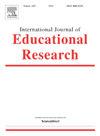Decoloniality, identity and the third space: The case of students’ experiences of well-being from an indigenous knowledge system university programme in south africa
IF 2.5
3区 教育学
Q1 EDUCATION & EDUCATIONAL RESEARCH
引用次数: 0
Abstract
This paper investigates the dimensions of well-being experienced by students in an Indigenous University programme at a historically disadvantaged South African university. It situates its analysis within the broader decolonial debate in Higher Education, which seeks to address colonial legacies and inequalities, particularly in Global South contexts like South Africa. Despite the significance of these debates, the paper highlights a gap in attention towards emerging decolonial Higher Education initiatives.
The theoretical framework employs Medina's (2012) kaleidoscope metaphor to integrate structural and self-identity aspects of well-being, capturing the dynamic negotiations of capabilities within the Indigenous University programme. This metaphor provides a ‘third space’ where students navigate cultural oppressions and opportunities, shaping their identities in a fluid and ever-changing educational landscape.
Findings suggest that such university degrees may align with moderate decolonial views, rooted in local understandings of well-being. This alignment facilitates an embodied hybridity in students, allowing them to navigate between Indigenous and Western paradigms of knowledge and existence. The study acknowledges its findings may not be universally representative but offers a theoretical contribution by merging the Capabilities Approach with structuralist and individualist perspectives. It provides a nuanced view of student experiences and self-perception in South African universities, emphasizing the potential of decolonial educational initiatives to foster dynamic approaches to well-being.
In conclusion, the paper underscores the importance of these programmes in promoting educational well-being, acknowledging the complex, hybrid nature of students' experiences in a globalized higher education system
非殖民化、身份和第三空间:南非土著知识系统大学项目学生的幸福体验案例
本文调查了在历史上处于不利地位的南非大学的土著大学课程中学生所经历的幸福的维度。它将其分析置于高等教育中更广泛的非殖民化辩论中,该辩论旨在解决殖民遗留问题和不平等问题,特别是在南非等全球南方背景下。尽管这些辩论具有重要意义,但本文强调了对新兴的非殖民化高等教育倡议的关注差距。理论框架采用了Medina(2012)的万花筒隐喻来整合幸福感的结构和自我认同方面,捕捉了土著大学项目中能力的动态谈判。这个比喻提供了一个“第三空间”,学生可以在这里驾驭文化压迫和机会,在一个流动和不断变化的教育环境中塑造他们的身份。研究结果表明,这些大学学位可能与植根于当地对幸福的理解的温和的非殖民化观点相一致。这种一致性促进了学生的融合,使他们能够在土著和西方的知识和存在范式之间导航。该研究承认其发现可能不具有普遍代表性,但通过将能力方法与结构主义和个人主义观点相结合,提供了理论贡献。它对南非大学的学生经历和自我认知提供了细致入微的看法,强调了非殖民化教育倡议在促进幸福的动态方法方面的潜力。总之,本文强调了这些项目在促进教育福祉方面的重要性,承认了学生在全球化高等教育体系中经历的复杂性和混合性
本文章由计算机程序翻译,如有差异,请以英文原文为准。
求助全文
约1分钟内获得全文
求助全文
来源期刊

International Journal of Educational Research
EDUCATION & EDUCATIONAL RESEARCH-
CiteScore
6.20
自引率
3.10%
发文量
141
审稿时长
21 days
期刊介绍:
The International Journal of Educational Research publishes regular papers and special issues on specific topics of interest to international audiences of educational researchers. Examples of recent Special Issues published in the journal illustrate the breadth of topics that have be included in the journal: Students Perspectives on Learning Environments, Social, Motivational and Emotional Aspects of Learning Disabilities, Epistemological Beliefs and Domain, Analyzing Mathematics Classroom Cultures and Practices, and Music Education: A site for collaborative creativity.
 求助内容:
求助内容: 应助结果提醒方式:
应助结果提醒方式:


